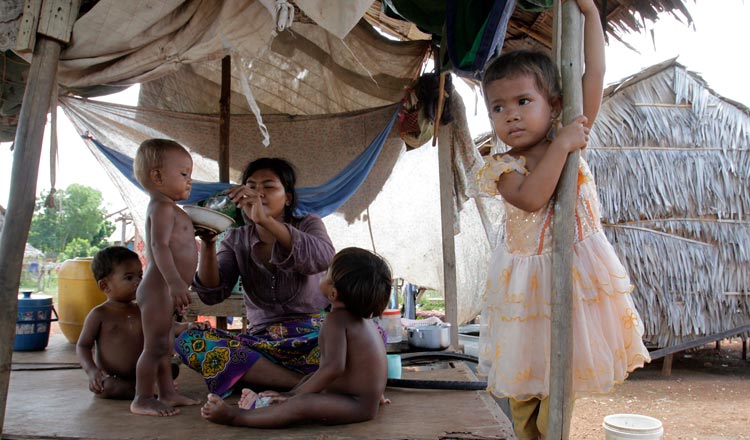 The goal is to drop the rate from 32 to 25 percent. KT/Chor Sokunthea
The goal is to drop the rate from 32 to 25 percent. KT/Chor Sokunthea
The government in collaboration with partner NGOs plans to significantly reduce child malnutrition in the Kingdom by 2023.
Representatives from the government and NGOs yesterday met in Phnom Penh to discuss a new five-year national strategy on food security and nutrition from this year until 2023.
Sok Silo, deputy secretary-general of Council for Agriculture and Rural Development, said that the National Strategy for Food Security and Nutrition 2019-2023 aims to reduce the number of stunted children under five-years-old to 25 percent by 2023 from the 32 percent achieved under a previous five-year strategy which began in 2014.
He noted that they also plan to reduce the number of malnourished children under five years to eight percent by 2023 from 10 percent under the previous strategy.
“These children are victims of malnutrition,” Mr Silo said. “The national strategy is to ensure sufficient food security for them by 2023.”
He added that to ensure the strategy’s success, the government is cooperating with partner NGOs to strengthen food security for children, especially during the first 1,000 days since birth.
Mr Silo urged communities to plant more crops, especially vegetables, to meet food supply needs and urged them to consume clean water and practice good hygiene.
Oum Kosal, assistant FAO representative in Cambodia, said that even though the country is developing, malnutrition remains a major challenge and the government and partner NGOs are working hard to address the problem.
“Women play a main role in ensuring family members, especially children, get nutritious food,” he said. “So the national strategy on food security and nutrition is finding ways to help them nourish their families.
Chea Sam Nang, director of cabinet of CARD, described children as being growing bamboos for the country’s future and said that it is important to ensure they have a healthy growth.
He noted that the lack of clean water and proper hygiene are the main causes of child malnutrition.
“We will identify areas with a high incidence of malnutrition, because of the lack of clean water and proper sewage facilities, and address these problems to help the children,” he said.
Hout Hay, Phnom Penh deputy governor, said the capital has a large population so there is a big demand for food.
He noted that although there is sufficient food supply in the capital, people’s health is at risk from tainted or fake food and those containing too much fat.
“Rice and vegetables are either brought into the city from farms in provinces or imported from abroad,” he said. “The relevant authorities should boost efforts to ensure that these do not contain chemicals or are fakes.”
In January, Plan International Cambodia launched its 1,000 Days Nutrition project in Stung Treng province for which it will spend $1.5 million over five years to provide better nutrition to children and women.
The project will benefit over 7,000 children under the age of six, including those with severe malnutrition, as well as 800 pregnant women.









